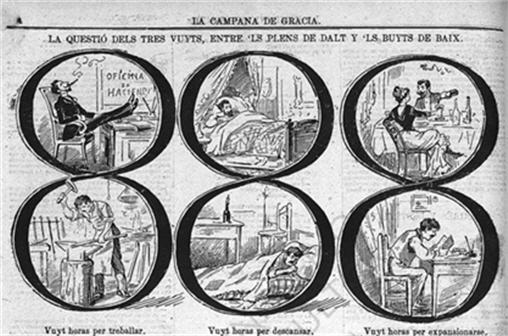Criteris correcció_L Figuerola S2_2018-19
Read the following text and answer the questions that follow.
|
|
Questions
- Which was the historical context of this text and what kind of source is it? (5-6 lines) (2 points)
(Context:When it was created, what was happening during this time period?
Isabel was the Queen, after Moderate years and The Progressive Biennium
Source:Textual, iconographical, statistical, cartographical, public/private: Picture, image, text, map... and justify your opinion) - Who is the main idea of the text?(5-6 lines) (2 points)
(What powerful words and ideas are expressed?)
All kinds of economic relations is leaving the market-that is, the law of supply and demand-that regulate the running of the economy, including the labour contract relations. Relationships between manufacturers and workers to establish the salary of the latter is based on supply and demand in the labor market. - Why/ How does this text reflect the liberal mindset? Q2_B1_LFIGU_3.mp3.
Do you agree with L. Figuerola? Who was he?(5-6 lines) (2 points)
(Explain and justify your opinion)
Why this text reflects the liberal mindset?
Before the triumph of liberal ideology, wages were regulated by guilds of craftsmen and not by the market. One of the basic components of the liberal ideology is to rid of barriers (customs, labor, state interventions, etc..) All kinds of economic relations is leaving the market-that is, the law of supply and demand-that regulate the running of the economy, including the labor contract relations
Do you agree with L. Figuerola? Who was he?
(Explain and justify your opinion)
The Catalan economist and politician Laurea Figuerola, born in Calaf on 4 July 1816, and died in Madrid on 28 February 1903, is known for creating the currency of the peseta. - Source 2 (4-5 lines) (2 points):
According to this source, which were the demands of the labour movement? What was the first of May?.
( As ... in source 8 the worker's demands were... 8 hours of...
The history of the 1st May. International Workers Day, was in commemoration of four anarchist executed for their demands on a 8 hours day in Chicago in 1886, and the subsequent execution of four innocent anarchist workers.
Some extra information- link-
Chicago anarchist- link- - Which were the demands of the labour movement in 1854? Who was Josep Barceló?(5-6 lines) (2 points)
(have a look at catalan activities source 2 vaga general 1855)
association rights
working and living conditions:8 hours
"juntas"
Army:milicia nacional
Conflict is known as the selfactinas,Barcelona in July 1854, against the mechanization of spinning selfactinas calls provided by (the term "self-acting"), spinning automatic machines that saved labor to which they blamed the layoff of many workers.
1854: a multitude of workers began in Barcelona spinners fire selfactinas several factories where they worked.
It was the first general strike in Spain, it took place in Barcelona because it was the main industrial center (mainly textil)
The strikers returned to work only when General Espartero Barcelona sent a personal message of yours which asked who should trust him, that he was "a son of the people who has never deceived the people." Then the workers 'associations sent to Madrid a paper, entitled Exposition laborer class to Cortes, calling for a law of workers' associations that regulated labor relations.
Josep Barceló was the leader of the labour movement, but he was convicted and executed.
|
Vocabulary |
Parliamentary commissioners: comissionats parlamentaris. social protection Work schedules per day/ per week 8 hours social or political decisions |
|
Useful sentences: |
This text clearly shows that… |
- Dictionary
- Linguee link
- 21st working conditions link